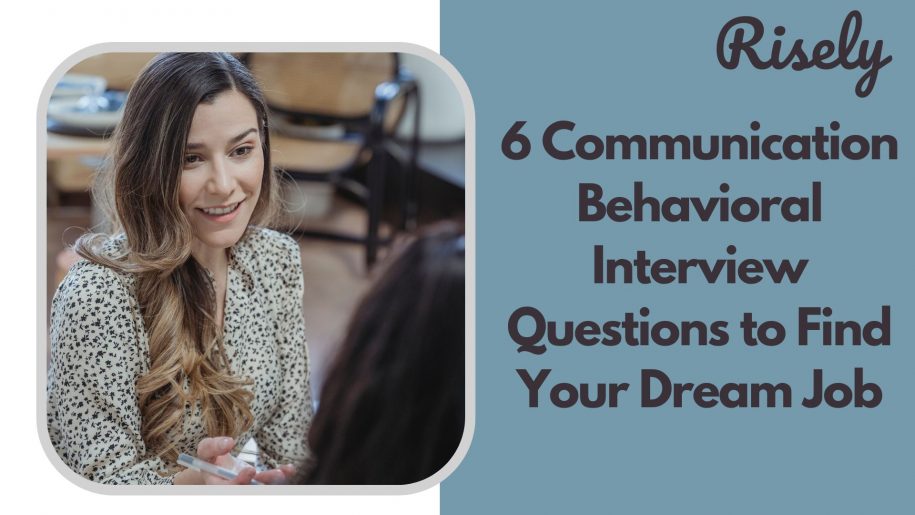6 Communication Behavioral Interview Questions to Find Your Dream Job
In the world of recruitment, hiring the right candidate with exceptional communication skills is crucial for fostering a thriving and collaborative work environment. While resumes can provide insights into a candidate’s qualifications and experience, communication behavioral interview questions offer a unique perspective on their communication abilities. These insightful communication behavioral interview questions delve into past experiences and scenarios, allowing employers to gauge how effectively candidates handle challenges, conflicts, and interactions in the workplace. In this blog, we will explore the significance of communication behavioral interview questions, their role in assessing a candidate’s communication prowess, and the impact of effective communication on team dynamics and overall organizational success. Join us as we uncover how to craft and evaluate these communication behavioral interview questions to identify top talent capable of fostering open dialogue, resolving conflicts, and creating a harmonious and productive work atmosphere.What are behavioral interview questions?
Behavioral interview questions are designed to assess a candidate’s past behavior in specific situations to predict how they might handle similar scenarios in the future. These questions focus on real-life experiences and examples, requiring candidates to provide detailed responses about how they approached challenges, interacted with others, and achieved outcomes in the past. The idea behind behavioral interview questions is that past behavior strongly indicates future performance. By understanding how candidates have handled various situations in the past, employers can gain insights into their problem-solving abilities, communication skills, adaptability, teamwork, leadership potential, and more.Other Interesting Reads
How can managers analyze the communication skills of candidates with behavioral interview questions?
Managers can effectively analyze candidates’ communication skills using communication behavioral interview questions by observing how candidates articulate their responses, convey information, and engage in the conversation. Here are some key points to consider:- Clarity and structure: Pay attention to how candidates organize their responses. Strong communicators typically provide clear and well-structured answers, starting with a concise introduction, then the main points, and concluding with a summary.
- Listening skills: Assess whether candidates actively listen to the questions before answering. Effective communication involves actively understanding the question and providing relevant responses directly addressing the interviewer’s inquiries.
- Conciseness: Evaluate the candidates’ ability to convey information concisely without being overly verbose. Effective communicators can deliver their message succinctly while still providing relevant details.
- Examples and specificity: Look for candidates with specific examples and real-life experiences to support their responses. Concrete examples demonstrate the candidate’s ability to communicate with clarity and coherence.
- Language and vocabulary: Observe the language and vocabulary used by candidates. Effective communicators use appropriate and professional language, avoiding jargon or overly technical terms that might be unclear to non-experts.
- Adaptability: Assess the candidate’s ability to adapt their communication style to the interviewer and the context. Strong communicators can tailor their responses to suit different audiences and situations.
- Handling difficult questions: Note how candidates handle challenging or unexpected questions. Effective communicators stay composed and respond thoughtfully without becoming defensive or flustered.
- Summarizing and Closing: Respond to how candidates summarize their responses and conclude their answers. Strong communicators provide concise conclusions reiterating key points and leaving a positive impression.

6 Communication behavioral interview questions
Importance of asking communication behavioral interview questions: Asking these communication behavioral interview questions is crucial for assessing a candidate’s communication skills, problem-solving abilities, adaptability, conflict resolution, and leadership potential. Effective communication is a cornerstone of successful teamwork and collaboration within any organization. By communication behavioral interview questions interviewer gains insights into a candidate’s past experiences and approaches to communication challenges, employers can determine their ability to navigate complex situations, build positive relationships, and contribute to a cohesive work environment.Can you describe a situation where you had to communicate complex information to a non-technical audience? How did you ensure clarity and understanding?
Example Answer: “In my previous role as a software developer, I had to explain a complex software update to our marketing team. To ensure clarity, I used visual aids like flowcharts and diagrams to illustrate the process. I presented the information in layman’s terms, avoiding technical jargon. I also encouraged questions and provided additional examples to reinforce understanding. The outcome was a well-informed marketing team that effectively communicated the software’s benefits to clients, resulting in increased sales.”Give an example of a project where effective communication was vital to its success. How did you ensure all team members were on the same page throughout the project?
Example Answer: “In a marketing campaign project, I led a cross-functional team with members from various departments. To ensure effective communication, I scheduled regular team meetings and utilized project management tools to share updates and timelines. I encouraged open communication and provided a platform for team members to ask questions and offer suggestions. This collaborative approach ensured that everyone understood their roles and responsibilities, leading to a successful campaign that exceeded our goals.”Describe a time when you had to persuade others to accept your idea or proposal. How did you present your case, and how did you address any resistance or objections?
Example Answer: “During a team meeting, I proposed a new process to streamline operations. To persuade others, I presented a well-researched and data-driven case, highlighting the potential benefits. I actively listened to concerns and addressed objections with supporting evidence. I also invited feedback and suggestions for improvement. The result was widespread support for the proposal, leading to its successful implementation and improved efficiency.”Can you share an experience where you needed to resolve a misunderstanding between two team members? How did you mediate the situation and restore effective communication?
Example Answer: “In a project, two team members had conflicting ideas on the best approach. I scheduled a private meeting with each member to understand their perspectives and concerns. I then facilitated a group discussion, encouraging them to express their viewpoints and actively listening to each other. Through open dialogue, we identified common ground and a compromise that integrated both ideas. This restored effective communication, leading to a collaborative and successful project outcome.”Tell me about when you had to adapt your communication style to effectively interact with someone from a different cultural background or communication preference?
Example Answer: “Working with an international team, I needed to adapt my communication style to accommodate diverse cultural norms. I researched cultural differences and adjusted my approach to be more indirect and respectful when giving feedback. I also used visual aids and diagrams to bridge language barriers. This fostered a positive and inclusive environment, promoting cross-cultural collaboration and understanding.”Describe a situation where you had to communicate a significant change or news to your team. How did you approach the communication to ensure a smooth transition?
Example Answer: “In a company reorganization, I had to communicate changes in team structures. I organized a team meeting to explain the reasons behind the changes and how they would benefit us in the long run. I provided clarity on new roles and responsibilities, addressing concerns and offering support during the transition. By being transparent and empathetic, the team embraced the changes positively, fostering a smooth transition and improved teamwork.”Conclusion
Effective communication lies at the heart of any successful organization, and behavioral interview questions are a powerful tool for assessing a candidate’s communication skills. Throughout this blog, we have delved into the significance of communication behavioral interview questions and how they offer valuable insights into a candidate’s ability to handle complex situations, collaborate with teammates, and adapt to diverse communication styles. By incorporating these carefully crafted communication behavioral interview questions into the hiring process, employers can identify candidates with the essential communication traits to build strong relationships, resolve conflicts, and foster a positive work environment. Skilled communicators contribute to improved team dynamics and play a key role in driving innovation, productivity, and overall organizational success. As employers, HR professionals, and hiring managers, embracing communication behavioral interview questions can lead to more informed and confident hiring decisions. Remember, not just the technical qualifications matter; effective communication is the cornerstone of seamless collaboration and an engaged workforce.Ready to hire exceptional communicators?
Take our free assessment on communication skills to elevate your hiring process and build a stronger, more cohesive team!
Frequently Asked Questions
What are the top 5 behavioral interview questions?
Top 5 Behavioral Interview Questions:
1. Can you describe a situation where you had to handle a difficult conversation with a team member or coworker? How did you approach the situation, and what was the outcome?
2. Give an example of when you had to persuade others to accept your idea or proposal. How did you present your case, and how did you address any resistance or objections?
3. Tell me about when you had to adapt your communication style to effectively interact with someone from a different cultural background or communication preference.
4. Describe a situation where you had to resolve a misunderstanding between two team members. How did you mediate the problem and restore effective communication?
5. Can you share an experience where you needed to communicate a significant change or news to your team? How did you approach the communication to ensure a smooth transition?
1. Can you describe a situation where you had to handle a difficult conversation with a team member or coworker? How did you approach the situation, and what was the outcome?
2. Give an example of when you had to persuade others to accept your idea or proposal. How did you present your case, and how did you address any resistance or objections?
3. Tell me about when you had to adapt your communication style to effectively interact with someone from a different cultural background or communication preference.
4. Describe a situation where you had to resolve a misunderstanding between two team members. How did you mediate the problem and restore effective communication?
5. Can you share an experience where you needed to communicate a significant change or news to your team? How did you approach the communication to ensure a smooth transition?
How do you show communication skills in an interview?
Showing communication skills in an interview:
– Be articulate and concise in your responses, avoiding rambling or excessive use of jargon.
– Active listening is crucial. Demonstrate attentiveness by maintaining eye contact, nodding, and paraphrasing the interviewer’s questions or comments.
– Use clear and specific examples to illustrate your points, showcasing your ability to convey information effectively.
– Be articulate and concise in your responses, avoiding rambling or excessive use of jargon.
– Active listening is crucial. Demonstrate attentiveness by maintaining eye contact, nodding, and paraphrasing the interviewer’s questions or comments.
– Use clear and specific examples to illustrate your points, showcasing your ability to convey information effectively.
Other Related Blogs
Performance Management Training: Empowering Managers To Manage Better
Performance Management Training: Empowering Managers To Manage Better Remember that feeling of dread when you knew performance review season was rolling around? Yeah, us, too. For many employees, performance reviews…
Manager Development Goals And How To Reach Them: Opportunities And Areas To Focus On
Manager Development Goals And How To Reach Them: Opportunities And Areas To Focus On You’ve meticulously crafted a development program for your high-potential employees, but their managers just aren’t on…
Leader Competence: The Cornerstone of Effective Leadership Development
Leader Competence: The Cornerstone of Effective Leadership Development Imagine you’re leading a talented team, but somehow, projects are stalling, and motivation seems slipping. You see the potential in your people,…
Confused by L&D Metrics? Here’s How to Focus on What Matters
Confused by L&D Metrics? Here’s How to Focus on What Matters You’ve undoubtedly witnessed companies celebrating a record number of employees completing leadership training programs. Champagne toasts erupt, press releases…


